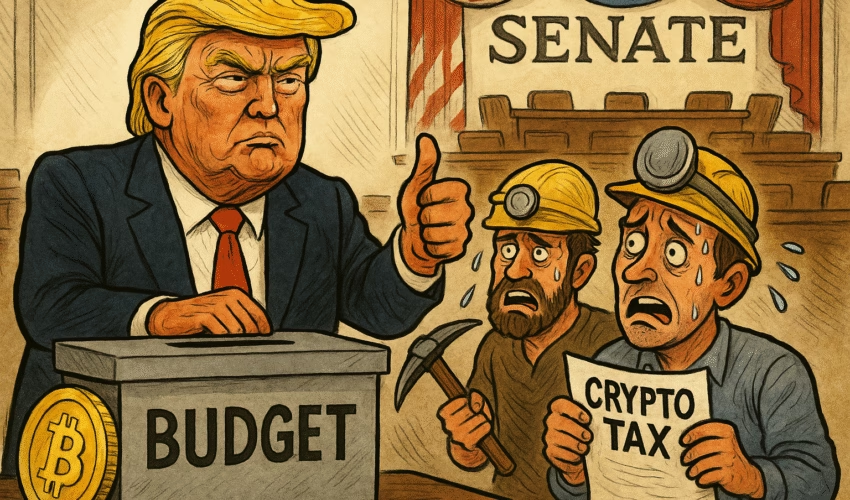US Senate Passes Trump’s Budget Bill Without Crypto Tax Relief for Miners and Stakers
The United States Senate has passed President Donald Trump’s highly contentious budget reconciliation bill, officially named the One Big Beautiful Bill Act, but excluded key provisions on cryptocurrency taxation—a significant omission for the crypto industry.
Slim Margin, Heated Debate
On Tuesday, the Senate passed the bill in a 50-50 split vote, with Vice President JD Vance casting the tie-breaking vote. All Democrats and three Republicans opposed the bill, which has faced widespread criticism over cuts to healthcare, AI regulation loopholes, and wealth redistribution via tax breaks for large corporations.
Crypto Tax Proposal Left Out
Senator Cynthia Lummis (R-WY), a long-time advocate for digital assets, had intended to include a provision to address double taxation on cryptocurrency mining and staking activities. However, her amendment never made it to the Senate floor, and the final version passed without any crypto tax reforms.
“I would have liked to have seen that [provision] in the final product,” said Representative Nicholas Begich (R-AK), who indicated that other legislative vehicles may offer a chance to revisit the matter.
For years, miners and stakers have been taxed TWICE. Once when they receive block rewards, and again when they sell it.
It’s time to stop this unfair tax treatment and ensure America is the world’s Bitcoin and Crypto Superpower. 🇺🇸
— Senator Cynthia Lummis (@SenLummis) June 30, 2025
Despite the omission, Lummis described the bill as “a major step in the right direction,” acknowledging it was “not perfect.”
Tensions Rise Over Big Tech and Crypto
Senator Elizabeth Warren (D-MA) slammed the bill on social media, claiming it effectively writes a $15 billion check to Meta, funded by “cutting health care for millions of Americans.” Her criticism reflects broader concerns about tech favoritism and lack of consumer protections in the legislation.
Meanwhile, Senator Jeff Merkley (D-OR) proposed an amendment mirroring elements of the GENIUS Act, seeking to ban government officials from owning or promoting digital assets. That amendment was rejected in the Senate vote.
Crypto Legislation Takes a Backseat—for Now
While several major crypto bills remain in progress—including:
-
GENIUS Act (stablecoin regulation)
-
BITCOIN Act (national Bitcoin reserve)
-
CLARITY Act (digital asset market structure)
Congress is expected to prioritize budget reconciliation over crypto-specific legislation until later in the year.
The GENIUS Act, which passed the Senate on June 17, is now before the House. Begich suggested that Trump’s influence may prevent significant amendments, stating: “There’s a strong push to get it to [Trump’s] desk with no add-ons.”
“I think Bitcoin reserve would be late this year, early next,” Begich added, noting that crypto legislation will likely remain secondary to fiscal negotiations in the near term.
Outlook
Despite the growing importance of digital assets, crypto tax reforms and regulatory clarity continue to face delays as U.S. lawmakers focus on partisan budget battles and broader political agendas. The crypto industry will likely have to wait until the next legislative window to see substantial progress.












